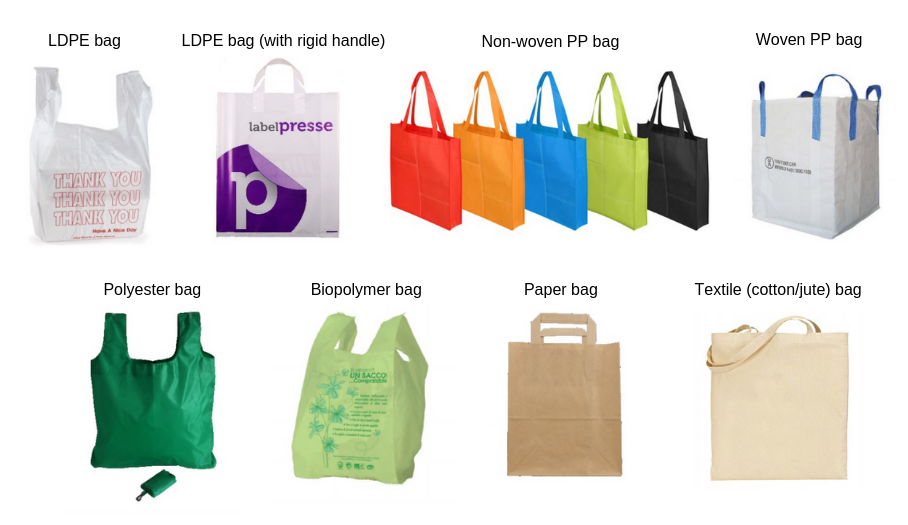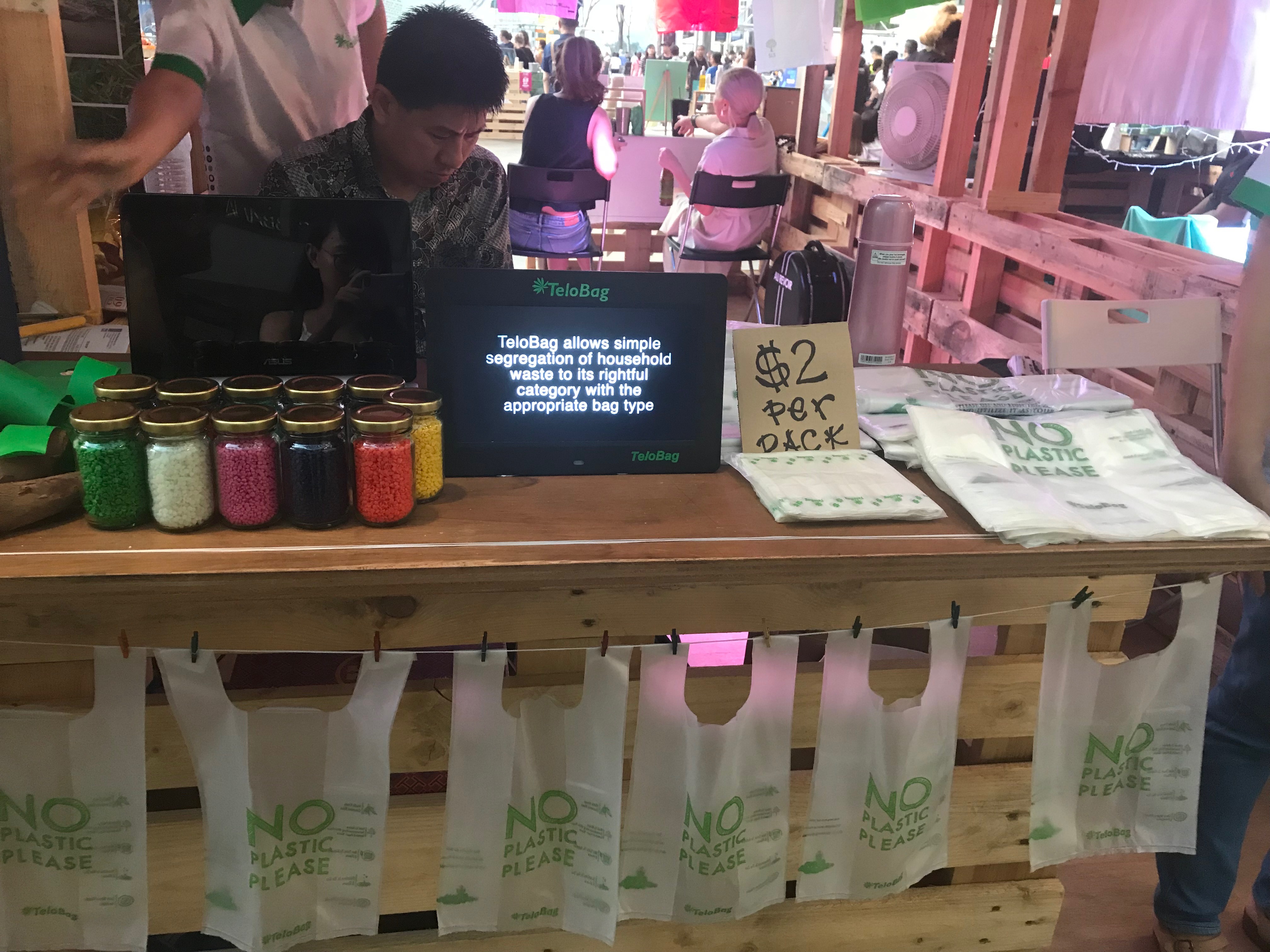To combat plastic pollution, many consumers have armed themselves with reusable tote bags for grocery shopping.
Those using reusable bags made of cotton have to think twice though.
Cotton tote bags are reportedly much more harmful to the environment than the oft-vilified plastic bag.
Comparing different types of carrier bags
A 2018 study by Denmark's ministry of environment and food compared the environmental impacts of a wide variety of carrier bags from cradle to grave.
This means that the environmental effects accumulated throughout the entire lifespan of the bag—including its manufacturing process—are calculated.
The bags assessed in the study include: conventional low density polyethylene (LDPE) bags, also commonly known by many as the supermarket type of plastic bags, non-woven reusable polypropylene (PP) bags, and non-organic and organic cotton tote bags among others.
 All types of bags included in the study. Photo collated from Danish Environmental Protection Agency, 2018
All types of bags included in the study. Photo collated from Danish Environmental Protection Agency, 2018
The study then takes into account environmental indicators such as climate change, ozone depletion, toxicity to humans and the ecosystems, along with other factors.
Plastic bags are the greenest
Cotton bags have flooded people's wardrobes around the world, and seem to have been a big part of the 'hipster' movement. They serve as a more stylish and trendy alternative to conventional carrier bags.
Therefore, this news may come as a surprise to many.
The study revealed that plastic bags are actually the most environmentally friendly while cotton tote bags fared the worst.
The environmental footprint of a cotton tote bag is much greater than a lightweight plastic bag, due to the fact that cotton crops require huge quantities of water, land and fertilisers.
Furthermore, plastic bags are much more wispy and lightweight compared to other types of cotton bags. Transporting 1,000 plastic bags across the world would require much less fuel than transporting an equivalent number of cotton bags.
Organic cotton is worse than conventional cotton
You would think that anything with the word 'organic' in the label would naturally be more sustainable.
But one of the findings in the Denmark study is that organic cotton totes are more harmful to the environment as well.
The study stated that in order to effectively compensate for the environmental impact caused by an organic cotton tote, you would have to reuse the tote 20,000 times.
This is compared to a regular cotton tote, which would have to be reused 7,100 times.
According to Quartz, organic cotton varieties have a lower yield, meaning that they produce less fibres per plant, as opposed to a regular cotton crop. As a result, more land is required to grow organic cotton.
In stark contrast, a plastic bag would only need to be reused once, before the environmental impact from its manufacturing would have been offset.
Marine pollution is not accounted for
However one important thing to note is that the study did not account for marine pollution.
Plastic bags are undoubtedly the biggest threat to marine life since they do not biodegrade, with numerous cases of turtles and whales suffering at the hands of the ubiquitous material.
As of now, it is still uncertain how long plastic actually takes to completely break down, with estimates ranging from 450 years to never.
Nevertheless, despite the harmful effects to the marine environment, plastic bags still seem to fare the best in terms of overall environmental impact.
What now?
Plastic's bad for the ocean, and tote bags are bad for the environment.
What options do consumers have left then?
Ultimately, as Alessandra Potenza says on The Verge, it really depends on what you care about.
If marine litter happens to be your biggest concern, then avoid plastic bags by all means. Paper bags are also a better option, as they are biodegradable.
An alternative choice would be to use biodegradable 'plastic' bags, such as the ones from Telobag.
They look and feel like plastic, but are made out of cassava roots and can dissolve in water—which means no more choking turtles or dead whales.
 Telobag selling their zero-plastic bags for S$2 per pack at Earth Hour Singapore. Photo by Ashley Tan
Telobag selling their zero-plastic bags for S$2 per pack at Earth Hour Singapore. Photo by Ashley Tan
Use reusable plastic bags
But if you want to limit your environmental footprint as a whole, using reusable plastic bags made of nylon, recycled plastic or woven PP (pictured below) are the best way to go.
 Woven PP bags. Photo from Danish Environmental Protection Agency, 2018
Woven PP bags. Photo from Danish Environmental Protection Agency, 2018
And whichever material the carrier bags are made out of, it would still be best to reuse them as many times you can until they wear and tear.
Even single-use plastic bags can be used twice, thrice or more, if consumers sacrifice a bit of convenience for the sake of the environment.
Lining the trash bin, using it for a second run to the supermarket or for shopping—there is a whole host of secondhand uses for plastic bags.
And truly, some people seem to be one step ahead already, as this tweet shows.
Asian people are the biggest recyclers of plastic bags. So when you see a turtle choking, don’t look at us. All of our plastic bags are in the cabinet under the sink. 😂💁🏾♂️
— Indian Stats v2 (@Indian_stats) October 29, 2018
As for cotton tote bags, the environmentally friendly practice is to either use them all the time, or not at all.
And even if you're guilty of harbouring several cotton totes at home, just aim to reuse them as many times as you possibly can.
With all the fuss about the type of carrier bag that's best for the environment, both The Verge and Quartz ended off with the same message: it is how you use and reuse your bag that matters the most.
Top photo from GettyImages
If you like what you read, follow us on Facebook, Instagram, Twitter and Telegram to get the latest updates.
